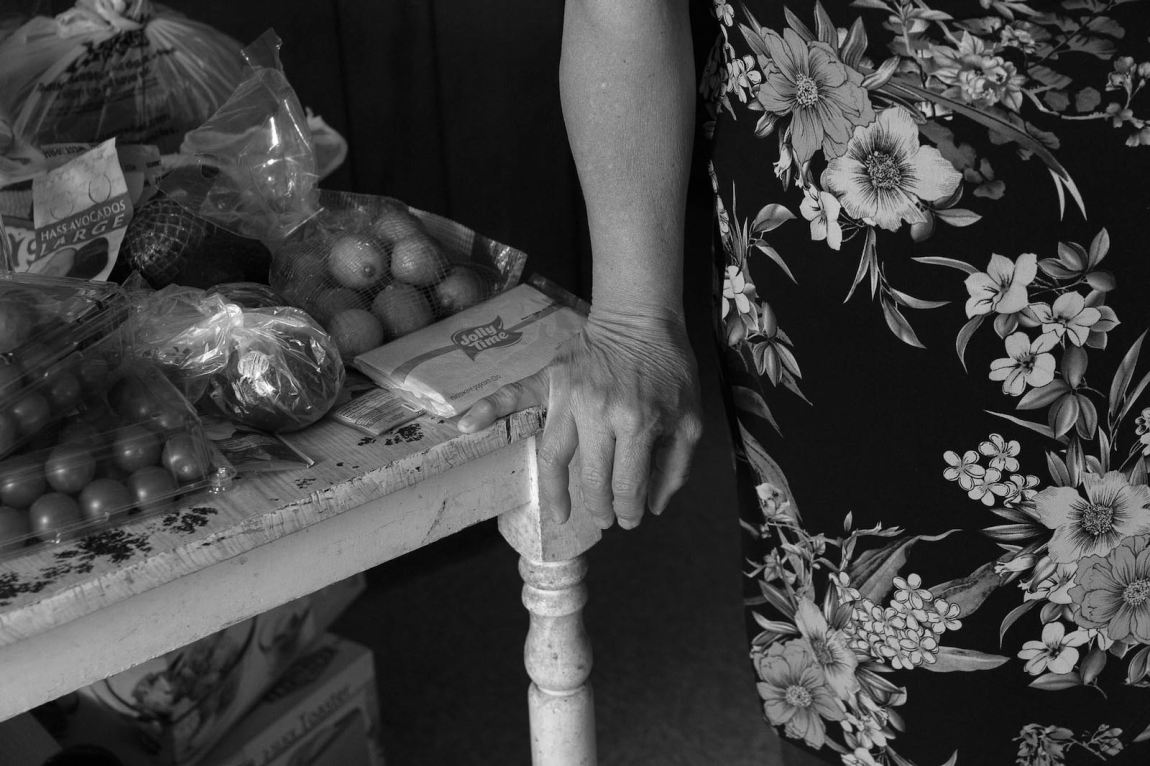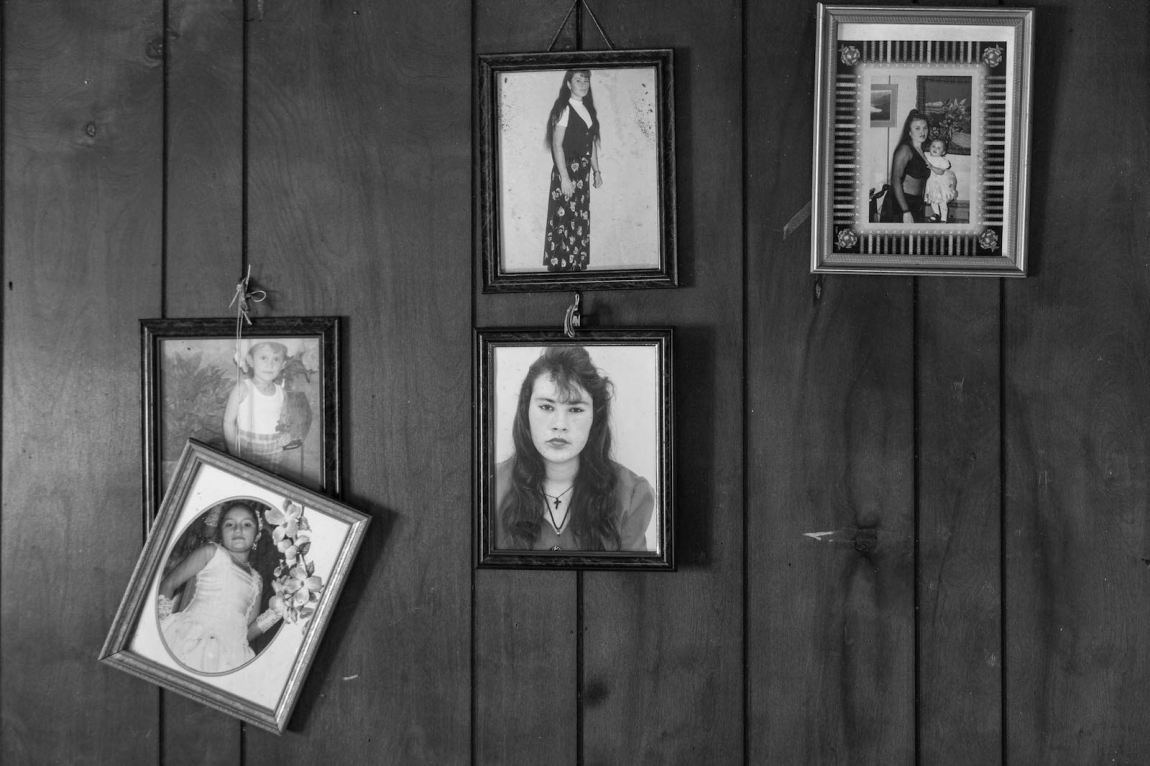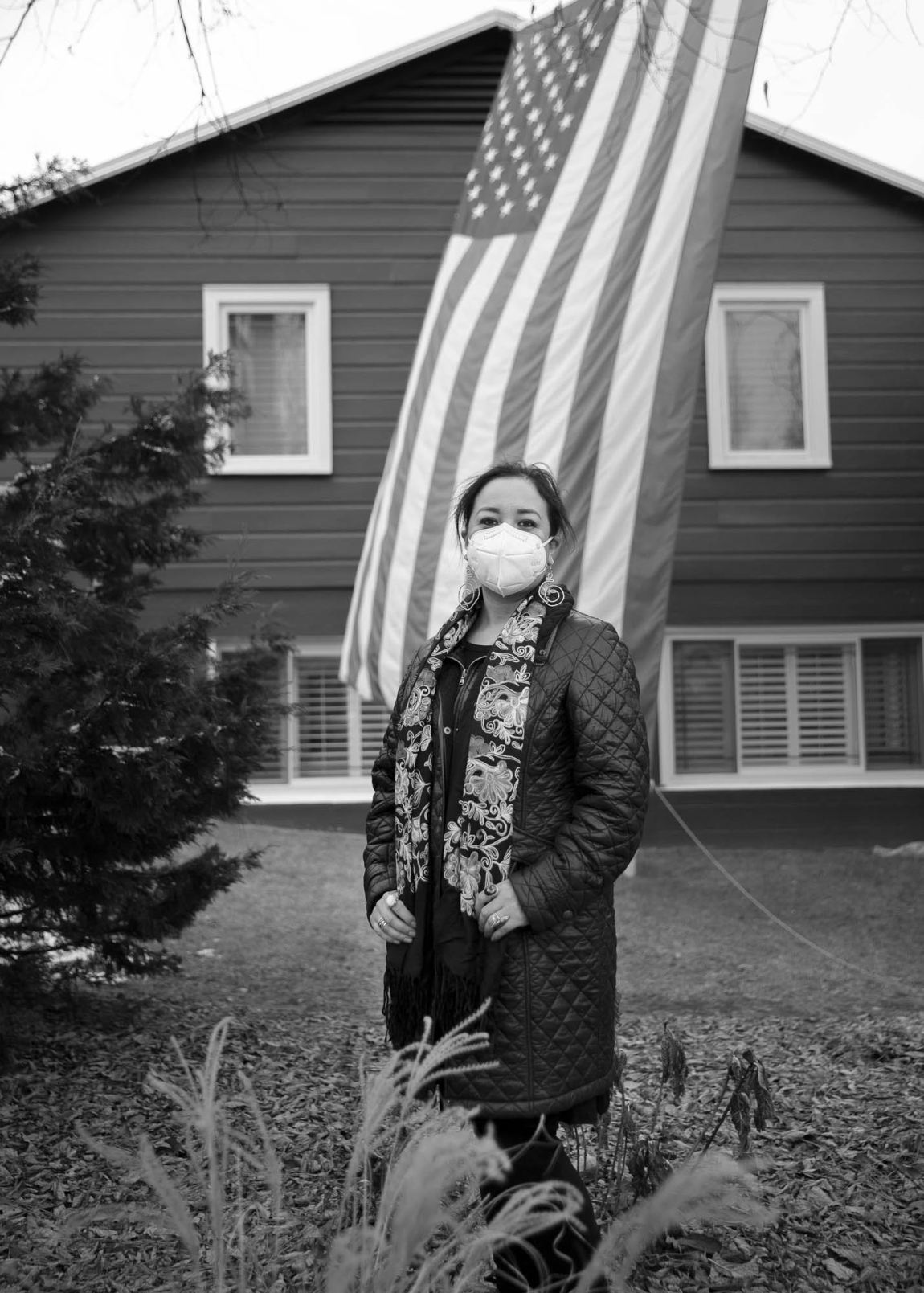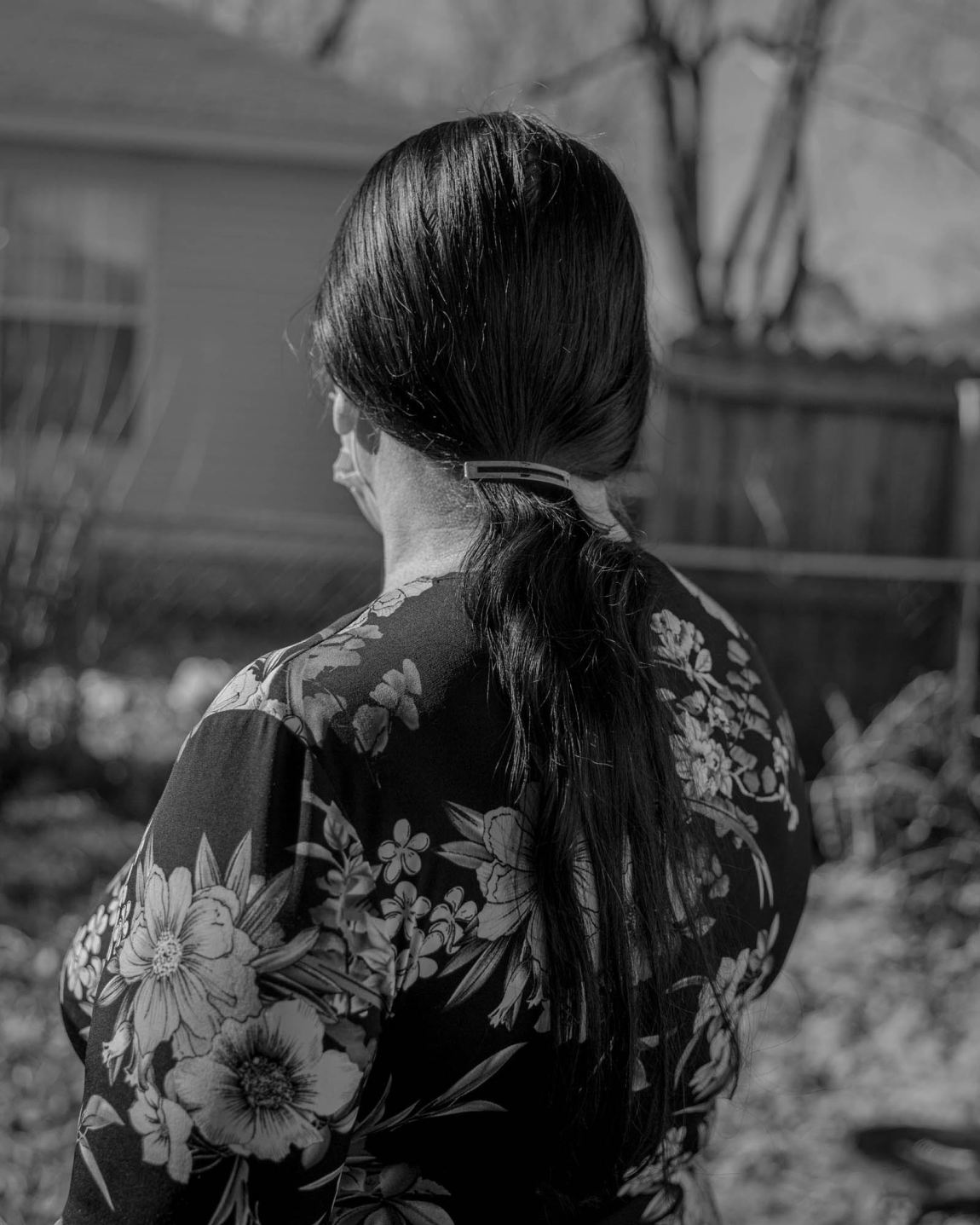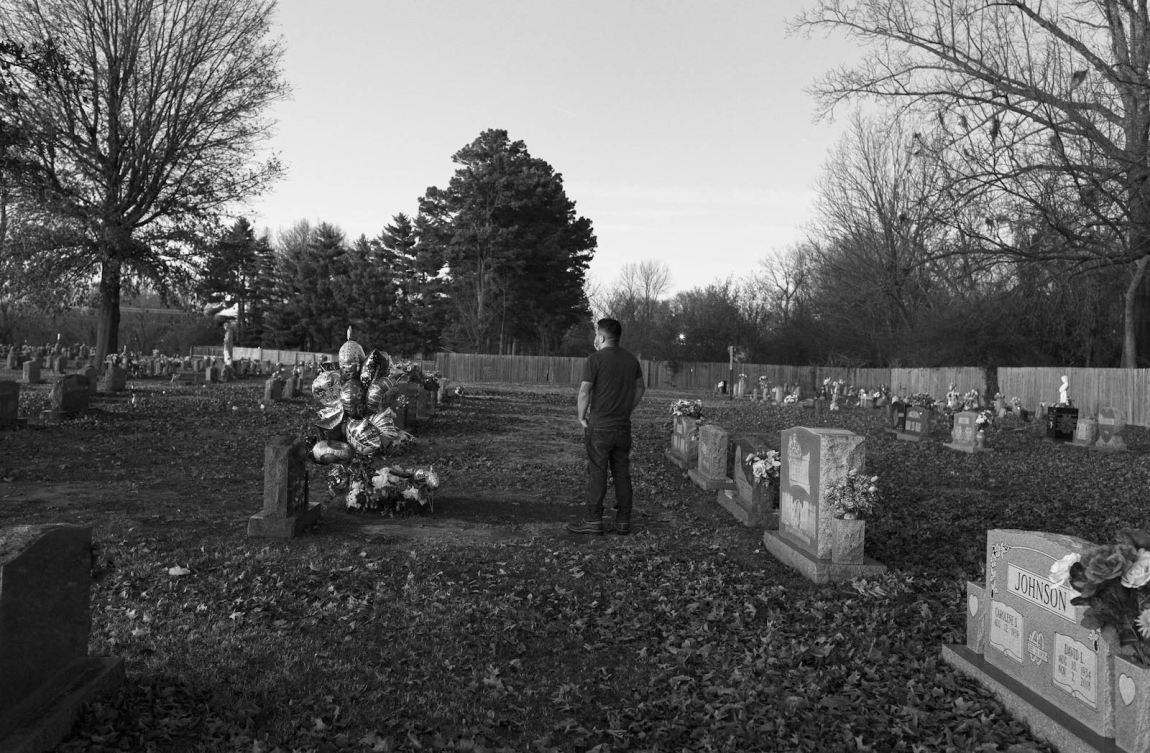• Leer en español/to read in Spanish.
In December, I drove to meet Ángela Pacheco, in Springdale, Arkansas. Standing in the backyard of her home, a small structure with peeling paint among a row of dilapidated houses, she told to me how, earlier that year, her husband, Plácido Leopoldo Arrue, had made plans to plant tomatoes. She covered her face with her hands to hide her grief.
A few days after discussing their future garden, he was hospitalized for Covid-19, which he’d contracted at work in a chicken-processing plant. Two months after that, on July 2, 2020, Arrue died. Unable to see her unconscious husband in person, Pacheco had had to say her last goodbye to him over video chat.
A small but sturdy sixty-year-old, with long black hair, white in patches, reaching to her waist, Pacheco said she wanted to tell her husband’s story because she wanted some measure of justice. Pacheco had never attended school, didn’t speak English, was illiterate and, like her deceased husband, was in the US from El Salvador on a temporary work visa. She, too, had been employed at the huge chicken-processing plant of Tyson Foods’ Springdale headquarters, where Arrue, seventy at the time that he died, had worked for nearly two decades.
The first thing I’d expected to hear was her account of Arrue’s death, but instead Pacheco told me about an injury he’d received at work a decade earlier, in 2011. Arrue was working a night shift at the Tyson Foods plant when an industrial accident exposed him to chlorine gas, a noxious substance that was first used as a chemical weapon in World War I and is now used in meat-processing to bleach and disinfect chicken parts. Symptoms from the chemical exposure persisted, as Arrue told his wife, Me siento que me estoy ahogando (“I feel as though I’m drowning”); a doctor later confirmed that the gas had severely damaged one of his lungs.
Immigrants like Arrue and Pacheco make up roughly 40 percent of America’s 470,000 meatpacking workers. Of those immigrant workers, at least 14 percent are undocumented. According to a CDC report from July 2020, 87 percent of the Covid-19 cases that occurred at meat- and poultry-processing facilities in the first two full months of the pandemic, April and May, involved nonwhite workers. By June, Tyson reported that 13 percent of its workers in Northwest Arkansas had tested positive for the virus.
Arrue had been infected in May. Ten of his family members, including his wife, also contracted the virus while helping to care for him. They would recover; Arrue did not.
*
Between April 2020 and April 2021, more than 57,000 meatpacking workers across the country tested positive for the coronavirus. Despite the risks, maintaining line production speeds came before safe quarantine practices during the pandemic. Following an intensive lobbying campaign carried out in the spring of 2020, led by Tyson Foods, which operates some 120 plants across twenty-nine states, the Trump administration declared the slaughterhouse and meat-processing sector “critical infrastructure,” making workers at these plants “essential.”
In the early days of the pandemic, Tyson installed temperature scanners and plastic barriers at its facilities and began providing face shields and masks to its workers. A Tyson spokesman, Gary Mickelson, told me via e-mail that Tyson formed a coronavirus task force in January 2020. One of the recommendations was that workers not come to work if they’d tested positive for the virus, and if they were exposed to it, they should return “only when they have met the criteria established by both the CDC and Tyson.” He added that workers who test positive are eligible for short-term disability pay.
In theory, workers who get seriously ill and incur medical costs should be eligible for workers’ compensation, but the burden of proving where they caught the disease is on them. “Under state workers’ comp, workers still have to show that there was a workplace injury and that there is a connection,” explained Brad Wendel, the Edwin H. Woodruff Professor of Law at Cornell University. “It is not surprising that employers say, ‘God only knows where you got this virus.’”
Mickelson said Tyson had hired monitors to ensure that workers wore personal protective equipment and practiced social distancing. But workers at facilities in Arkansas shared videos with me that showed colleagues working elbow to elbow, their bodies packed together as if Covid-19 didn’t exist. “The CDC has acknowledged that social distancing is not possible in every case and has provided guidance for those situations where it may not be, which Tyson has met or exceeded,” the spokesman commented.
Despite that claim, cavalier attitudes and lax measures at one Tyson pork slaughterhouse, in Waterloo, Iowa, led to more than one thousand workplace infections, and at least six deaths. It subsequently emerged that seven managers had been fired for running bets on the number of workers who would test positive for the coronavirus. A wrongful death suit filed by the family of one of the victims accused Tyson Foods of “willful and wanton disregard for workplace safety.”
Advertisement
In June 2020, Arkansas’ Republican governor, Asa Hutchinson, signed a limited liability executive order that shielded companies like Tyson from litigation for such claims of compensation by families of workers who’d died from the virus after being infected in the workplace. About a dozen other states adopted similar measures. That left workers with little recourse even if the meat-processing companies had failed to put in place adequate safety measures against Covid-19.
Lisa Pruitt, a professor at UC Davis School of Law, called such limited liability executive orders “constitutionally questionable” because the executive authority under which they were issued, during a public health emergency, remains largely untested in the courts. “Whether these liability shields are enforceable is one more legal unknown to be litigated,” she said.
Even if workers and their families know about the liability shield and understand its import, they then face the huge additional hurdle of finding a lawyer willing to take their case—since it will involve having to sue the state first to find out if it’s even possible to launch a civil suit against the company for damages.
*
I grew up in the small Arkansas town of Oark, about sixty miles southeast of Springdale, in the Ozark Mountains. Over the years, I have seen the ways meatpacking companies like Tyson have used their money to influence state and national lawmakers. I began to make contacts in the immigrant communities that worked at Tyson, including Karen refugees from Myanmar, workers from the Marshall Islands, and others from Central America and Mexico. The workers I interviewed were extremely fearful of being fired by Tyson for speaking to a journalist, even though I offered them anonymity.
In September, in Clarksville, Arkansas, I interviewed a Karen worker and his wife at their home with the help of a Karen translator whose parents also worked at Tyson. They asked to remain anonymous for fear of retaliation. This couple had met and married in a refugee camp in Thailand. Before that, said the wife, “We had to run from the Burmese military most of the time.” Her husband, who worked the night shift at Tyson as a cleaner, went to take a nap while we talked.
“My husband got the virus already in July,” she went on. “I got it. I got really sick. I was scared and I couldn’t breathe. My husband stayed home one-and-a-half weeks, and he didn’t receive any pay or help from Tyson during that time.” Her children, too, had had it. Then the translator spoke up, “I also had Covid.” Of eight of us, I was the only person in the room who had not had the disease.
Several Tyson workers I interviewed told me that when they or others tested positive, managers at Tyson asked them to keep working if their symptoms were not severe. In February this year, a Mexican worker told me about a conversation he’d had with his manager after he’d reported being directly exposed to a person with Covid-19. “If you don’t feel symptoms today, you can keep working,” he was told. The worker insisted that he wanted to get tested, so the next day Tyson let him speak to an on-site nurse. “If you don’t feel symptoms right now, you can continue working,” the nurse said, adding that if he wanted to get tested right away, he’d have to go to an outside clinic and pay for it himself.
Inevitably, as I drove home from conducting a series of interviews last November, I realized I wasn’t feeling well. I stopped at a Covid-19 rapid testing center. After a few hours sitting in a parking lot, I learned I was positive. The illness knocked me out. I spent the next two weeks in bed, feverish and short of breath, monitoring my oxygen levels. While I was ill, many of the workers I’d interviewed who’d had the disease gave me advice over the phone about how to take care of myself.
*
I first met Ángela Pacheco at a December 5, 2020, vigil in Springdale for meat-processing workers who had died of Covid-19. Pacheco stood alone, her head down, as workers lit candles in memory of colleagues: Plácido Arrue, Raúl Camacho, Salvador Zamorano, Khammy Nothongkham, Alonso Rosa, Manuel Mandujano, Jesús Lavato Molina, Martín Barroso, Martín Arenas, and Viensong Phanphengdee.
Advertisement
The vigil had been organized by Magaly Licolli, the thirty-eight-year-old cofounder of the Arkansas-based poultry workers’ rights group Venceremos. “Many workers have a million medical bills,” she told me, and indebted families of those who’ve died of Covid-19 have faced threats of eviction. Yet these jobs are precious in immigrant communities, and people are fearful of losing them. “These companies have done a tremendous job making workers afraid of even speaking up,” Licolli said.
Pacheco had been overwhelmed by expenses since her husband’s death and funeral. In the end, she had to ask family back home in El Salvador for donations to cover the bills.
The lack of any compensation for these families is a product of a long-standing bipartisan failure to protect meatpacking workers. The liability shields are one example of how big meatpacking companies take advantage of the political sway they wield to undermine legal protections for workers and achieve lax regulations. And they’ve been at it for decades.
During the 1992 presidential election, Ross Perot called Bill Clinton, then the governor of Arkansas, “chicken man”—a reference to his close relationship with Donald Tyson, the former head of Tyson Foods. As governor, Clinton oversaw relaxed environmental regulation of the meatpacking industry, leading to contamination of drinking water, as well as hundreds of miles of rivers and streams. Tyson Foods, in particular, also received millions of dollars’ worth of tax breaks from the state during the Nineties.
Democrats’ ties to meat processing companies did not end with Clinton. Tom Vilsack, agriculture secretary first during the Obama administration and now again under President Joe Biden, allowed poultry plants to increase their slaughter line speeds and outsource certain federal inspection duties to company employees. In The Meat Racket, originally published in 2014, author Chris Leonard argued that the Obama administration wanted to look business-friendly and gave into lobbying, rather than taking on abuses within the industry.
During the Trump administration, poultry lobbyists representing companies like Mountaire continued to hold significant sway over lawmaking. In April 2020, even as reports of coronavirus outbreaks at meat-processing plants piled up, Trump spoke in favor of liability protections for meatpacking plants—a big win for the industry, which spent weeks lobbying and making crucial donations to Rebuilding America Now, a pro-Trump Super PAC. Later that month, the president sealed the deal by classifying meat-processing plant employees as essential workers.
In November 2020, I interviewed the family of Martín Barroso, a fifty-five-year-old Mexican-born Tyson worker who’d died of Covid-19. Barroso, like Arrue, had worked nearly twenty years at Tyson in Springdale, earning just over $13 an hour to pack chicken feet in ice. His hospital treatment left his family with a $650,000 medical bill. They have no way to pay, they told me.
In December, I visited Barroso’s grave in Springdale with one of his sons. While he wanted to share his father’s story in hopes of helping to protect other workers, he also worried about whether Tyson might retaliate against family members who still worked there. He himself had switched to working at a different meat-processing company. Grief-stricken, Javier said he’d been depressed since his father’s death, even as the bills kept piling up. Now he was just tearing them up when they arrived.
A Tyson worker from Guatemala described a similar experience, insisting that she had been “infected there at Tyson.” Unwittingly, she passed the coronavirus on to her husband, who was at home recovering from an operation. “I didn’t know what sickness I had yet,” she said. “I got tested at the beginning of June, and I stayed home, but my husband became very sick. One night, he couldn’t breathe and I took him to the hospital.” He died three days later. She continues to receive medical bills, totaling about three thousand dollars. Unable to pay rent, she is now facing eviction: “I am poor. I don’t have money for a lawyer.”
Arrue, Barroso, and so many others like them suffered preventable deaths. They were considered essential to keep up the line speeds, but if they came down with the virus, it turned out they were expendable. I’ve seen their families hang black bows on the doors of their homes in honor of the dead, and I’ve attended vigils for their loved ones. I’ve been impressed, above all, by how many of them—often undocumented, with little or no schooling, without English, and with few options for legal redress—have nevertheless refused to be cowed by corporate power.
“All they [Tyson Foods] care about is work,” said Ángela Pacheco. “They don’t care about lives.”



